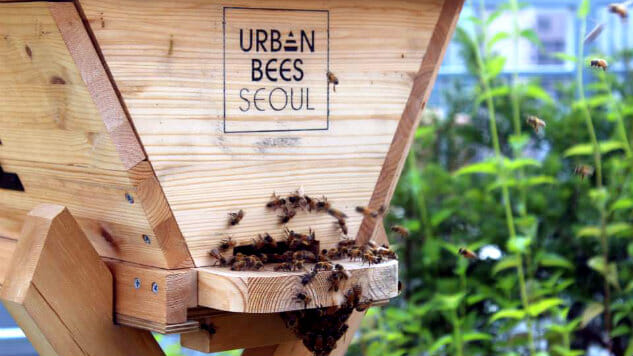Urban Bees Seoul Lures More Believers With Honey
Photos by Dakota Kim
On a rooftop high above the brightly-lit beauty shops and potato tornado vendors of pulsating Myeongdong, a young man stands amongst crepe myrtle trees and tigerlilies, carefully lighting a flame and igniting the contents of a funny-looking little stainless steel pitcher. He walks over to a wooden box on stilts and lifts the roof off of it, funneling smoke inside from the stainless steel container.

It’s time for Jin Park to check on the beloved queen bee of a hive belonging to his non-profit Urban Bees Seoul, which educates South Koreans about the source of one of their most beloved and least understood foods. The stainless steel pitcher pours forth smoke that temporarily subdues the bees, allowing him to take a careful look inside the hive to ensure that the queen is alive and healthy, and that honey is being produced.

Koreans are extremely amorous of the ancient sweet that was once reserved only for the royal and the wealthy. They will pay premium prices for the supposedly more nutritious honey of the apis cerana, the Asian honeybee. Many Koreans take royal jelly and propolis supplements or purchase pricey manuka honey from New Zealand. Honey is the star ingredient of an entire line of products by popular beauty brand Skin Food, and propolis features in multiple products as well.
How interesting then, that this paradise for honey lovers hosts a population fearful of the creators of their beloved food. In 2013, the Seoul Metropolitan Government began to allow urban beekeeping within its confines, sparking fear that bee swarms would be dangerous. Park’s job is to help Seoulites understand how integral bees are to not only food culture, but the survival of all Koreans.

“When it comes to bees, city people think they’re dangerous,” Park said. “Changing people’s opinions is really hard, so we use media and education to raise awareness of how they are. There haven’t been any incidents, so people are realizing that they’re safe.”
Park understands the appeal of connecting food and bees.

“First, you explain through food,” Park said. “If you don’t have bees, you can’t have almonds, or apples. One-hundred percent of those things will disappear without bees.”
-

-

-

-

- Curated Home Page Articles By Test Admin October 21, 2025 | 3:10pm
-

- Curated Home Page Articles By Test Admin October 21, 2025 | 2:57pm
- Urls By Test Admin October 21, 2025 | 2:57pm
- Curated Home Page Articles By Test Admin October 21, 2025 | 2:55pm
-

-

-

-

-

-

-

-

-

-

-

-

-

-

-

-

-

-

-

-

-

-

-

-

-

-

-

-

-

-

-








































